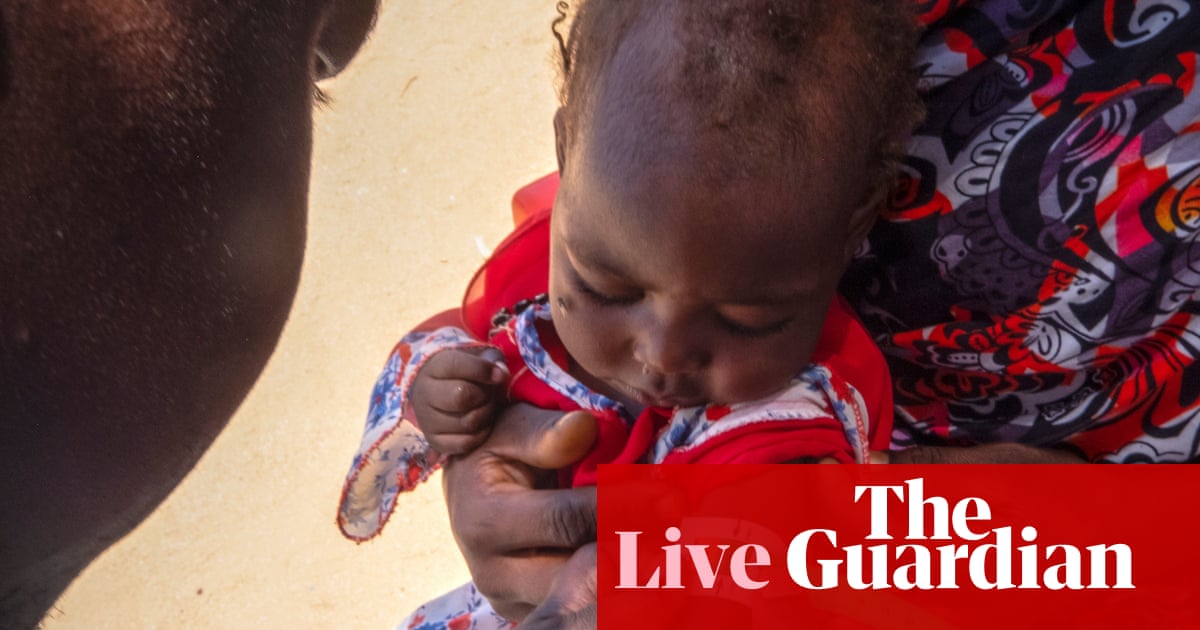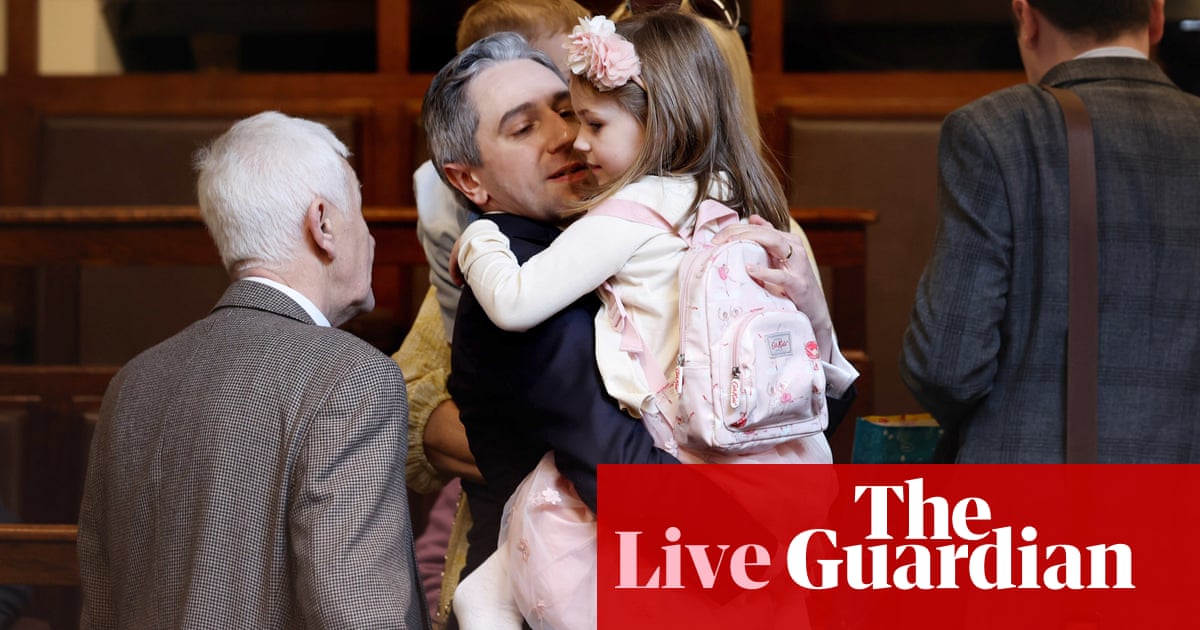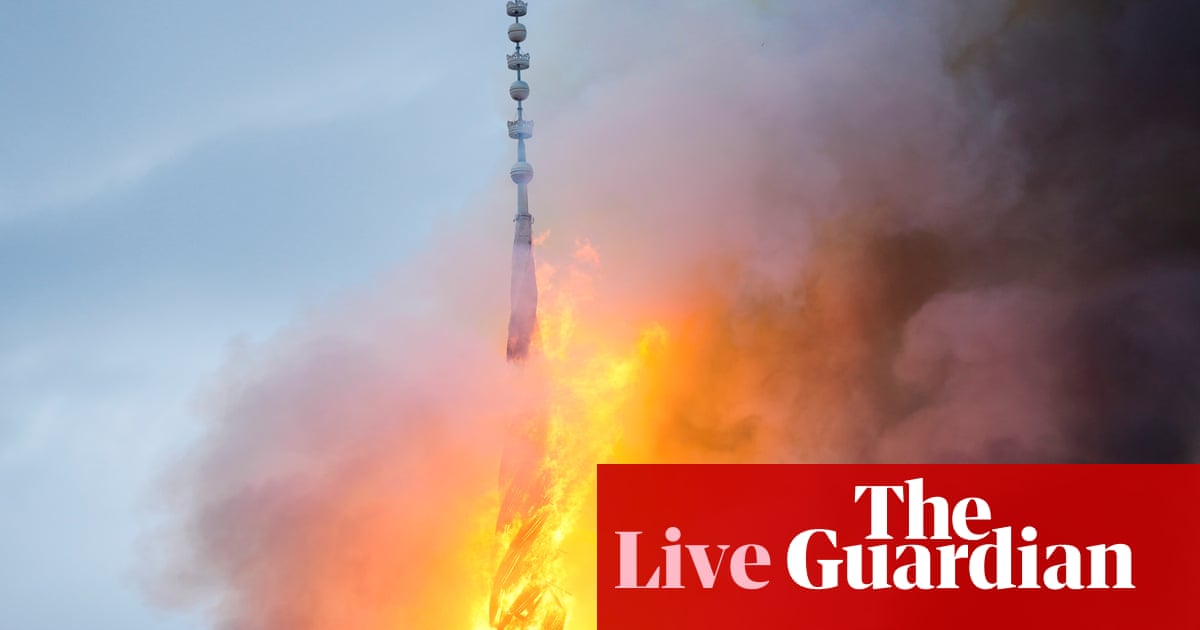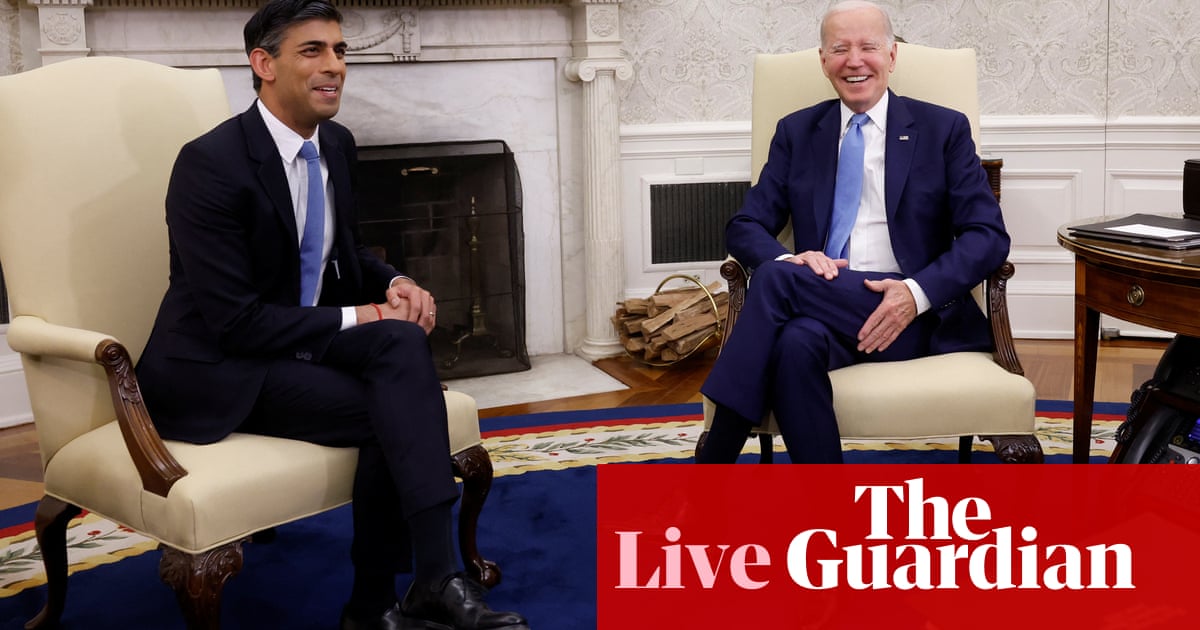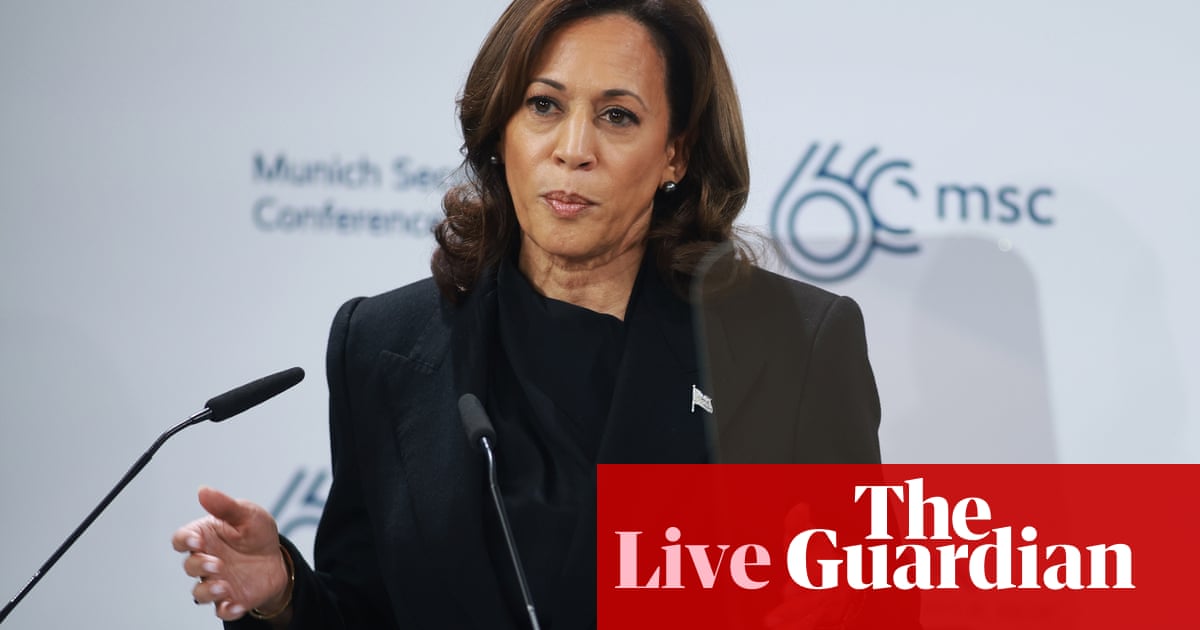
America committed to global engagement, vice-president Harris says, blasting isolationism as "dangerous"
Speaking at the Munich Security Conference, Kamala Harris, the US vice-president, said:
We’ve all just received reports that Alexei Navalny has died in Russia. This is of course terrible news, which we are working to confirm. My prayers are with his family, including his wife Yulia, who is with us today. And if confirmed, this would be a further sign of Putin’s brutality. Whatever story they tell, let us be clear: Russia is responsible and we will have more to say about this later.
Speaking about the future of America’s role in global leadership, she said:
These are questions the American people must also ask ourselves: whether it is in America’s interest to continue to engage with the world, or to turn inward. Whether it is in our interest to defend longstanding rules and norms that have provided for unprecedented peace and prosperity, or to allow them to be trampled. Whether it is in America’s interest to fight for democracy or to accept the rise of dictators. And whether it is in America’s interest to continue to work in lockstep with our allies and partners or go it alone.
She added:
I believe it is in the fundamental interest of the American people for the United States to fulfil our longstanding role of global leadership.
As president Biden and I have made clear over the past three years, we are committed to pursue global engagement, to uphold international rules and norms, to defend democratic values at home and abroad, and to work with our allies and partners in pursuit of shared goals.
As I travel throughout my country and the world, it is clear to me: this approach makes America strong. And it keeps Americans safe.
Harris also said some in the US disagree with this approach, describing some as wanting to isolate America, to “embrace dictators” and “abandon commitments to our allies in favour of unilateral action.”
Let me be clear: that worldview is dangerous, destabilising and indeed short-sighted. That view would weaken America and would undermine global stability and undermine global prosperity.
She praised Europe for standing with Ukraine, saying: “You have made clear that Europe will stand with Ukraine. And I will make clear president Joe Biden and I stand with Ukraine.”
And she stressed that Nato has deterred aggression to the benefit of Americans, and that the alliance has stood by America – pointing out that Europeans are stepping up on their defence spending.
“America will continue to lead,” she said, concluding her speech.
Summary of the day
Leaders, ministers and experts gathered for the first day of the Munich Security Conference.
Discussions were set to focus on Ukraine and the Middle East.
The Russian prison service said opposition leader Alexei Navalny has died in jail.
Reports of Navalny’s death shifted the mood at the conference, as his wife, Yulia, unexpectedly took the stage.
Kamala Harris, the US vice-president, gave a speech underscoring the Biden administration’s commitment to pursue global engagement and American leadership.
António Guterres, secretary-general of the United Nations, said the global order not working for anyone.
Israel Katz, Israel’s foreign minister, defended his government’s approach in Gaza.
Representatives of Israeli hostages’ families made a public plea for their return.
Evika Siliņa, the Latvian prime minister, made a case for boosting investment in defence.
Kaja Kallas, the Estonian prime minister, said “this is the European hour and we need to rise to the challenge.”
The Nato secretary-general, Jens Stoltenberg, said that “if we want a lasting peace, we must continue to provide Ukraine with weapons and ammunition.”
David Cameron, the British foreign secretary, said in Munich that “Britain has always supported a two-state solution, and a two-state solution meaning, a state of Israel, secure in its borders, and a Palestinian state, secure in its own borders.”
He added:
Clearly, that requires the recognition of a Palestinian state.
And Britain’s view has always been that we should recognise that state when it best contributes to the process of peace and development of this two-state solution.
And what I said, which I think was perhaps a tiny bit new, but not revolutionary, was: I don’t think that recognition should come at the start of the process – because I think there are lots of things the Palestinians need to do to – from their end – make sure that state can function properly with a good, effective government – but it shouldn’t have to come at the end, it is something that can be part of the momentum. And we need to see this irreversible momentum towards a two-state solution, and it can be part of that.
In Munich, the European Commission president, Ursula von der Leyen, met with Yulia Navalnaya.
Speaking at a Munich Security Conference panel on risks to global economics, the British foreign secretary, David Cameron said: “I think the biggest risk is the worry that we might not have the political will to solve problems even when we know what the answers are.”
He also said:
The Trumpian case for protectionism is not the cause of populism, it’s the symptom, and we have to deal with the underlying causes – and in all our countries I think it’s the same, it’s that people feel left behind, some people, some places by globalisation.
In Munich, the EU’s high representative, Josep Borrell, met with Alexei Navalny’s wife, Yulia.
“Yulia’s spirit is unbreakable. Putin is responsible for murder & will be accountable,” he said.
In Munich, representatives of Israeli hostages’ families are now making a plea for the return of their loved ones.
Some insight into the mood, behind the scenes.
"This is the European hour", Estonian leader says
Kaja Kallas, the Estonian prime minister, has arrived in Munich.
“This is the European hour and we need to rise to the challenge,” she said.
“Defence matters and the best way to show that is to spend on defence.”
Navalny"s wife addresses conference amid reports of his death
Yulia Navalnaya, Alexei Navalny’s wife, took the stage at the Munich Security Conference.
“I thought, ‘should I stand here before you or should I go back to my children’? And then I thought, ‘what would have Alexei done in my place’? And I’m sure that he would have been standing here on this stage,” she said.
“I don’t know should we believe the terrible news we get, the news we get only from the official media, because for many years – and you know all this – we have been in this situation, we cannot believe Putin and his government, they are lying constantly,” she said.
She added:
But if it is the truth, I would like Putin and all his staff – everybody around him, his government, his friends – I want them to know that they will be punished for what they have done with our country, with my family and with my husband.
They will be brought to justice, and this day will come soon.
And would like to call upon all the international community, all the people in the world, we should come together and we should fight against this evil. We should fight this horrific regime in Russia today. This regime and Vladimir Putin should be personally held responsible for all the atrocities they have committed in our country the last years.”
Navalnaya then got a standing ovation from the audience of leaders and senior officials.
Alexei Navalny’s wife, Yulia, is at the conference in Munich, attending US vice-president Kamala Harris’ speech just after news broke of her husband’s death.
America committed to global engagement, vice-president Harris says, blasting isolationism as "dangerous"
Speaking at the Munich Security Conference, Kamala Harris, the US vice-president, said:
We’ve all just received reports that Alexei Navalny has died in Russia. This is of course terrible news, which we are working to confirm. My prayers are with his family, including his wife Yulia, who is with us today. And if confirmed, this would be a further sign of Putin’s brutality. Whatever story they tell, let us be clear: Russia is responsible and we will have more to say about this later.
Speaking about the future of America’s role in global leadership, she said:
These are questions the American people must also ask ourselves: whether it is in America’s interest to continue to engage with the world, or to turn inward. Whether it is in our interest to defend longstanding rules and norms that have provided for unprecedented peace and prosperity, or to allow them to be trampled. Whether it is in America’s interest to fight for democracy or to accept the rise of dictators. And whether it is in America’s interest to continue to work in lockstep with our allies and partners or go it alone.
She added:
I believe it is in the fundamental interest of the American people for the United States to fulfil our longstanding role of global leadership.
As president Biden and I have made clear over the past three years, we are committed to pursue global engagement, to uphold international rules and norms, to defend democratic values at home and abroad, and to work with our allies and partners in pursuit of shared goals.
As I travel throughout my country and the world, it is clear to me: this approach makes America strong. And it keeps Americans safe.
Harris also said some in the US disagree with this approach, describing some as wanting to isolate America, to “embrace dictators” and “abandon commitments to our allies in favour of unilateral action.”
Let me be clear: that worldview is dangerous, destabilising and indeed short-sighted. That view would weaken America and would undermine global stability and undermine global prosperity.
She praised Europe for standing with Ukraine, saying: “You have made clear that Europe will stand with Ukraine. And I will make clear president Joe Biden and I stand with Ukraine.”
And she stressed that Nato has deterred aggression to the benefit of Americans, and that the alliance has stood by America – pointing out that Europeans are stepping up on their defence spending.
“America will continue to lead,” she said, concluding her speech.
While leaders convey key political messages in their speeches and panels in Munich, for many officials the conference is just as much about the behind the scenes talks and networking across countries and institutions.
Representatives of Israeli hostages’ families sit in the audience as the country’s foreign minister speaks in Munich.
Israel is seeking peace, minister says in Munich
Israel Katz, Israel’s foreign minister, is now speaking in Munich.
Israel has no intention to deport Palestinians from the Gaza strip, he said, accusing Hamas of using civilian sites.
Israel does not want to harm civilians, so we move them to safe zones while Hamas tries to prevent it, he said, underscoring that Israel’s goal is to ensure that Gaza will be demilitarised and that the IDF will continue acting any terror activities.
This war is not only our war, it is the war of the free world, the Israeli minister said.
Israel is seeking peace and willing to make peace with any nation willing to make peace with it, and would be happy to make peace with Saudi Arabia and anyone else who extends a hand for peace, he said.
He also criticised UNRWA and said there are other international organisations that can replace it in Gaza.
Iran, the minister said, is the head of the axis of evil.
Addressing anti-Semitism, he described “dangerous” incitement against Jews and Israel, calling on governments to take serious steps against anti-Semitism.
Israel will not leave an area where Hamas is present unaddressed, he said, but will operate in Rafah after coordinating with Egypt. Israel will act in a way that doesn’t harm Egyptian interests, the minister said.
Speaking of the situation concerning Rafah, he said there is enough space within Gaza for the population to be evacuated and not be harmed, he argued.
Global order not working for anyone, UN chief says
António Guterres, secretary-general of the United Nations, said at the Munich Security Conference that “today’s global order is not working for everyone – in fact, I would go further and say – it’s not working for anyone.”
He added:
Our world is facing existential challenges. But the global community is more fragmented and divided than at any time during the past 75 years. Even the cold war era was in some ways less dangerous.
Guterres said that we still face a nuclear danger in the multipolar world, while also dealing with the climate crisis and the risks of uncontrolled AI.
Multipolarity has created important opportunities for balance and justice, and for new leadership on the global stage. But a transition to multipolarity without strong global institutions can create chaos. When power relations are vague, the dangers of aggressive opportunism and miscalculation grow.
And today we see countries doing whatever they like with no accountability.
Impunity seems to be the name of the game. And so we must all be determined to re-establish the primacy of the rule of law.
Conference opens
Christoph Heusgen, chairman of the Munich Security Conference, is now formally opening this year’s conference.
He said:
For six decades, we have tried to provide you with a platform to search for peace through dialogue, our motto.
In his opening speech, he said the conference mourns Henry Kissinger, one of its most “faithful guests.”
He also said we “mourn today Alexei Navalny.”
“A very special man, our thoughts are today with his wife and his children,” Heusgen said, noting that Navalny’s wife is in Munich and was due to attend the conference “and talk about a better Russia.”
Pressure builds on Israel to ditch Rafah offensive as ministers gather in Munich
Western leaders are hoping a round of meetings at the Munich conference will put overwhelming pressure on Israel not to press ahead with a ground offensive in Rafah.
Almost all the key figures, save the Iranian foreign minister, Hossein Amir-Abdollahian, will be present in Munich on Friday, including foreign ministers from Saudi Arabia, Egypt, Qatar and Jordan.
The Israeli president, Isaac Herzog, and foreign minister, Israel Katz, will also attend along with three freed hostages, Raz Ben Ami, Adi Shoham and Aviva Siegel. Antony Blinken, the US secretary of state, is flying in too.
The pressure on Israel to avoid a ground offensive is coming from almost all quarters, including allies such as the US, UK, France, Canada, Australia and New Zealand. The shadow of a return to the international court of justice and a further Algerian-sponsored UN security council resolution is looming over Israel.
Since Tuesday, Egypt has hosted representatives from the US, Israel’s main supporter, and Qatar, where the Hamas political leadership is based, for talks about a lengthy truce, including the release of more hostages. No breakthrough has been achieved.
News of the death of Russian opposition leader Alexei Navalny has quickly impacted the mood at the conference, with ministers and leaders assembled in Munich issuing strongly-worded statements.
It remains to be seen how much the news of what is likely to be seen as a political assassination will impact the three-day conference, which was expected to focus on the Middle East and Ukraine.
Here’s how participants see the Munich Security Conference’s role this year and the messages they want to convey to fellow attendees.
Hanno Pevkur, the Estonian defence minister, told us that “as always, MSC gives the opportunity to speak out and to discuss on the most acute topics. A lot of on and off the record discussions on Ukraine, European and world security.”
Tytti Tuppurainen, a member of the Finnish parliament and former minister, said: “we must strengthen our support for Ukraine and listen to their needs.”
She added:
Putin must be stopped in Ukraine. Europe has to ramp up its military capabilities in order to take more responsibility of the security of our continent.
This also means we have pay more attention to the High North i.e. European Arctic where Russia is increasing its military presence significantly.
Here at MSC it’s great to exchange with so many colleagues and friends.
Alexei Navalny dies in prison
The Russian opposition leader Alexei Navalny has died in jail, the country’s prison service has said, in what is likely to be seen as a political assassination attributable to Vladimir Putin.
Navalny, 47, one of Putin’s most visible and persistent critics, was being held in a jail about 40 miles north of the Arctic Circle where he had been sentenced to 19 years under a “special regime”. In a video from the prison in January, he had appeared gaunt with his head shaved.
The Kremlin said it had no information on the cause of death.
In early December he had disappeared from a prison in the Vladimir region, where he was serving a 30-year sentence on extremism and fraud charges that he had called political retribution for leading the anti-Kremlin opposition of the 2010s. He did not expect to be released during Putin’s lifetime.
Details here from Helen Sullivan and Andrew Roth.
And more updates on our Russia-Ukraine war blog.
Valdis Dombrovskis, the EU’s executive vice-president, has underscored the need to avoid protectionism.
Evika Siliņa, the Latvian prime minister, has made a case for boosting investment in defence.
“For Latvia, increased defense investment is a necessity and also a way to build our common deterrence capabilities. Important to invest wisely in order to strengthen the local industry,” she said.
Investing in defence provides more jobs, Stoltenberg says
Speaking in Munich today, the Nato secretary-general, Jens Stoltenberg, said that “if we want a lasting peace, we must continue to provide Ukraine with weapons and ammunition.”
He addressed Nato’s push to invest more in defence.
This requires expanding our transatlantic industrial base to increase deliveries to Ukraine and refill our own stocks. And shifting from slow peacetime to the high tempo of conflict – to produce more at a higher speed.
This will help Ukraine, it will make Nato stronger, and it will provide more highly–skilled manufacturing jobs, including here in Bavaria, where Patriot missiles will be built at a new facility.
This is another example of European and North American companies working together for our shared security.
Ahead of the Munich Security Conference’s official kick-off, a demonstration is taking place outside the venue against the Iranian regime.
Defence spending in spotlight at Munich
With European Nato members keeping a close eye on the upcoming US election and Donald Trump’s critique of Nato, defence spending is now top of mind for officials.
But while many European countries have boosted investment in defence, there are also financial and domestic political considerations at play.
Behind the scenes: Here are some photos from Munich this morning.
Donika Gërvalla-Schwarz, Kosovo’s deputy prime minister, said she will hold discussions in Munich “on some of today’s most pressing security challenges—including the growing security threats toward Kosova & the region.”
“"I will emphasize the imperative for action to uphold peace & stability in the Western Balkans,” she added.
Ukraine’s president, Volodymyr Zelenskiy, is set to spend the next few days meeting with western officials and advocating for more aid for Kyiv.
He will be speaking in Munich tomorrow.
“We are making every effort to end the war as soon as possible on fair Ukrainian terms and ensure a lasting peace,” the president said.
Speaking in Munich this morning, Lebanon’s prime minister, Najib Mikati, called for the protection of humanitarian workers and civilians.
In an event on the sidelines of the conference organised by the Order of Malta, he also addressed the situation in the region.
The conflict in the Middle East, he said, “will not end without a two-state solution that includes an independent, sovereign Palestinian state.”
“A sovereign Lebanon is essential, not just for the Lebanese people, but also for the region, peace and stability,” he said.
What to expect today
It’s the first day of the Munich Security Conference.
Key speakers today will include:
Kamala Harris, the US vice president
António Guterres, secretary-general of the United Nations
Nana Akufo-Addo, president of Ghana
Gustavo Petro Urrego, president of Colombia
David Cameron, the British foreign secretary
Israel Katz, the Israeli foreign minister
What to expect in Munich
At the historic Hotel Bayerischer Hof, where the Munich Security Conference takes place every year, we ran into Benedikt Franke, MSC’s vice-chair and chief executive officer as he was greeting guests.
We asked him to tell Guardian readers what themes he expects will dominate discussions over the coming days.
This year our main theme is lose-lose, because we believe we have entered a world where there are increasing attitudes of zero-sum thinking.
What we want to do with this conference is to provide a few examples of silver linings in what seems like a very complicated world, and how to include the global south in transatlantic and global security.
Welcome to the blog
Good morning and welcome to a special edition of the live blog, coming to you from the Munich Security Conference.
Over the next three days, leaders, diplomats, activists and businesspeople will be gathering in Munich.
The annual meeting is always closely watched, but this year it will be especially so, given concerns about the situation in the Middle East, Russia’s war in Ukraine and the future of the transatlantic alliance.
Many officials have already arrived – on a flight from Brussels to Munich last night, we spotted several senior officials headed to the conference, including the EU’s foreign policy chief, Josep Borrell.
Stay tuned for updates and analysis, and send your tips and reactions to lili.bayer@theguardian.com.




